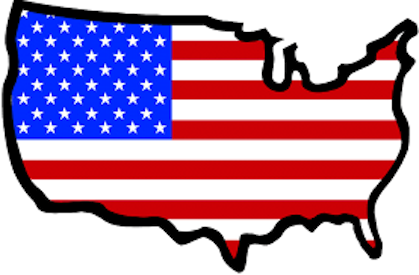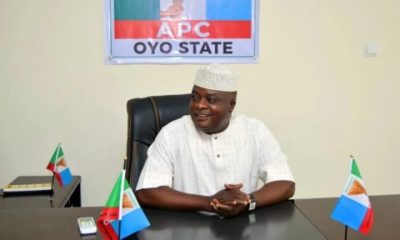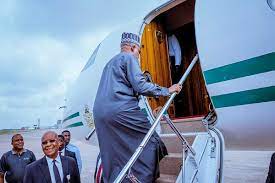Foreign News
US Indicts FG, Security Agencies in Latest HR Report

By Orkular Shaagee, Abuja
The United States Government has released its reports on Human Rights Practices and again indicted Nigeria of abuses.
The 46-paged report, signed by the US Secretary of State, Mike Pompeo, covered year 2019, comprised seven sections and dozens of sub-sections, which include: “Respect for the Integrity of Persons; Respect for Civil Liberties; Freedom to participate in the Political Process”.
Others are: “Corruption and Lack of Transparency in Government; Governmental attitude regarding NGOs’ Investigation of Human Rights Abuses; Discrimination, Societal Abuses and Trafficking in Persons; Worker Rights.
The dossier, which compiled atrocities by the government and its agents, seemed to give more insight into why the Trump administration slammed repeated sanctions on Nigeria in the last one year.
Its detailed accounts of President Muhammadu Buhari government and its agents’ arbitrary, unlawful, or extrajudicial killings. The Nigeria Police, the Nigerian Military, the Department of State Services (DSS) and state organs were accused of using lethal force to disperse protesters, apprehend criminals and suspects.
Noting that authorities did not hold security agencies accountable for the use of deadly force, the report lamented that Federal and States’ panels of inquiry reports are never made public.
It recalled that in 2017, Vice President Yemi Osinbajo, while in acting capacity, convened a presidential investigative panel to review security agencies’ compliance with human rights obligations, rules of engagement, and submitted its findings in February 2018. “As of September (2019), no portions of the report had been made public”.
On attack on Shiites, the statement said as of September 2019, the federal government was silent on further investigating or holding individuals accountable for the 2015 killing and mass burial of members of the Islamic Movement of Nigeria (IMN), and other civilians by the Army in Zaria, Kaduna State.
The US wondered why the report on the 2017 Air Force erroneous bombing of an Internally Displaced Persons (IDP) camp in Rann, Borno State, which killed and injured more than 100 civilians, humanitarian workers and Nigerian Army personnel, has not been released.
On disappearances, the world power mentioned that the publisher of Bayelsa State-based tabloid the Weekly Source, Jones Abiri, was held for more than two years in incommunicado detention by the DSS without trial, access to counsel, or family visitation.
The US also referred to the arrest and harassment of Stephen Kefas, Agba Jalingo and the missing Abubakar Idris, aka Dadiyata. The blogger and critic of the federal and Kano State governments was abducted from his home in Kaduna State in August 2019.
Nothing has been heard about him since and the DSS, the state agency notorious for secretly holding Nigerians, has denied taking Idris.
The case of citizen Abdullahi Ahmadu. He had been in DSS custody since 2013 without access to the court or family members before his situation leaked.
Another Nigerian, Anthony Okolie, was arrested and detained by the DSS for nearly three months for ownership of a phone number recycled after it became dormant.
Okolie legally purchased the line from MTN but was secretly kept because the number earlier belonged to Buhari’s daughter, Hanan. The matter is in court.
The United States expressed concern over Human Rights Watch (HRW) report on arrests and detentions of journalists and activists, saying such indicated a growing intolerance of dissent.
The country reiterated concern about the security situation in Nigeria, the murder of innocent citizens, deadly communal/ethnic clashes, bandits’ attacks, among others.
It said abductions for ransom were still going on and observed that on May 1, 2019, armed assailants kidnapped the nephew of President Buhari and held him for more than two months before he was rescued.
The report confirmed that torture and other cruel, inhuman, or degrading treatment were carried out by security agencies. It decried the activities of Special Anti-Robbery Squad (SARS) of the Nigeria Police and remarked the #EndSARS campaign on social media.
It included findings by groups such as Amnesty International (AI) on illegal detention, inhuman treatment, and torture of criminal suspects, militants, detainees and prisoners.
“According to reports, security services committed rape and other forms of violence against women and girls, usually with impunity. In April, AI reported at least 10 soldiers in Giwa Barracks sexually exploited female detainees, demanding sex in exchange for food, soap, other basic necessities, and the promise of freedom.
“As of September the government had not held any responsible officials to account for reported incidents of torture in detention facilities in the Northeast, including Giwa Barracks.”
The US denounced the “parading of arrestees in public spaces and subjecting them to public ridicule and abuse. Bystanders often taunted and hurled food and other objects at arrestees.”
The report criticised the Justice System in Nigeria, condition of prisons and that authorities sometimes held female and male prisoners together, especially in rural areas. “Prison authorities often held juvenile suspects with adults….Most of the 240 prisons were 70 to 80 years old and lacked basic facilities”, it said.
It slammed arrests without prosecution and referred to reports of thousands of deaths in custody. The US said the military continued to indefinitely hold women and children alleged to have links with Boko Haram and ISIS-WA (ISWAP).
The US expressed concern over threats to journalists and referred to HRW exposition on arrests and detentions of journalists and activists indicated a growing intolerance of dissent.
The country deplored onslaught against freedom of movement, protests and expressions; intimidation over use of internet, the legislation being used by Federal and State governments to arrest opponents and critics for alleged hate speech.
The US cited the 2019 elections conducted by the Independent National Electoral Commission (INEC). It said there was evidence that military and security services intimidated voters, electoral officials, and election observers.
It noted that many Nigerians believe the Army is a tool of the ruling party in many parts of the country and regretted that several INEC Resident Electoral Commissioners (RECs) reported DSS operatives intimidated them when they attempted to protect voting materials.
“There were reports that corruption, including vote buying were historically high during the 2018-19 electoral season. Examples of vote buying were apparent in the re-run of the Osun gubernatorial election in September 2018, and during the Kano gubernatorial election on March 9.”
“Although the law provides criminal penalties for conviction of official corruption, the government did not implement the law effectively, and government officials frequently engaged in corrupt practices with impunity. Massive, widespread, and pervasive corruption affected all levels of government, including the judiciary and the security services.
“The constitution provides immunity from civil and criminal prosecution for the president, vice president, governors, and deputy governors while in office. There were numerous reports of government corruption during the year”, it read.
The US echoed complaints by the Independent Corrupt Practices Commission (ICPC) and the Economic and Financial Crimes Commission (EFCC) on delays in convictions on lack of judges and the widespread practice of filing for and granting multiple adjournments.
“EFCC arrests and indictments of politicians continued throughout the year, implicating a significant number of opposition political figures and leading to allegations of partisan motivations on the part of the EFCC.”
The US added that in April 2019, Supreme Court Chief Justice Walter Onnoghen was convicted of falsely declaring his assets for failing to reveal money held in five foreign bank accounts.
“President Buhari had suspended Onnoghen over the charges of failing to disclose assets in January several weeks before the presidential election.”
The US recorded that Buhari removed Onnoghen unilaterally without endorsement by the Senate or from the National Judicial Council (NJC) as the law requires.
“The timing and process of Onnoghen’s suspension led many opposition candidates, lawyers, and civil society leaders to accuse President Buhari of meddling with the independence of the judiciary.”
The report further condemned forced labour, sexual discrimination, religious intolerance, early forced marriage, baby factories, violence against children and women, domestic violence and Female Genital Mutilation/Cutting (FGM/C).
It called for effective and timely prosecution of rape and other cases, recognition of ethnic minorities, better welfare for workers in the private and public sectors, improved attention to senior citizens, displaced people and persons with disabilities.
Foreign News
Zelensky Announces New Draft Law on Anti-corruption Bodies after Protests

Ukrainian President Volodymyr Zelensky said he has approved the text of a draft law guaranteeing the freedom of two anti-corruption bodies in Ukraine – days after nationwide protests broke out over changes curbing their independence.
Kyiv’s Western partners had also expressed serious concerns over the legislation.
On Thursday, Zelensky seemed to backtrack, saying the new bill was intended to safeguard the independence of Ukraine’s National Anti-Corruption Bureau (Nabu) and Specialised Anti-Corruption Prosecutor’s Office (Sap), and to protect them from Russian influence.
He said the text of the bill was “balanced”, but did not provide any details.
The law passed earlier this week brought Nabu and Sap under the control of the prosecutor general, who is appointed by the president.
At the time Zelensky justified his decision to curtail the bodies’ powers by citing Russian influence. The day before, Ukraine’s security services had carried out searches and arrests targeting alleged Russian spies at the agency.
The passing of the legislation instantly sparked the largest protests since the start of Russia’s full-scale invasion in February 2022 in several cities across Ukraine, with many worrying the law would severely undermine the Nabu and Sap’s authority and effectiveness.
Thousands of people gathered in streets and squares across Ukraine, holding placards calling for the legislation to be vetoed.
Several commentators accused Zelensky of democratic backsliding. Their concerns were further exacerbated when Ukraine’s Western partners signalled their displeasure with the bill.
Ukraine has official EU candidate status and a spokesman for European Commission chief Ursula von der Leyen previously warned Kyiv that the rule of law and the fight against corruption were “core elements” of membership to the bloc.
On Thursday, the Commission said it “welcomed” the Ukrainian government’s decision to take action against the bill.
“We are working [with the Ukrainian government] to make sure that our concerns… are indeed taken into account,” the spokesman said.
Nabu and Sap were created in 2014-15 as one of the requirements set by the European Commission and International Monetary Fund to move towards a relaxation of visa restrictions between Ukraine and the EU.
Writing on Facebook, opposition MP Oleksiy Goncharenko noted Zelensky said that “the independence of anti-corruption institutions must be guaranteed.”
“First we take it away, and then we say that it must be guaranteed. So why was all this necessary?”
In his message on social media on Thursday, Zelensky did not acknowledge the protests or the backlash but said it was “important that we respect the position of all Ukrainians and are grateful to everyone who stands with Ukraine.”
Foreign News
US Senators Exempt HIV/Aids Funding from Planned Spending Cuts

Republicans in the US Senate have said they will spare the US-backed HIV/Aids programme Pepfar from cuts, amid a larger effort to reduce government spending.
Senators said they would end a plan to cut $400m (£300m) from the President’s Emergency Plan for Aids Relief programme, leaving total proposed cuts at $9bn.
The proposition was made in a Senate amendment to a rescissions package – meaning a bill that allows lawmakers to cancel previous funding approved by Congress.
The planned cancellations also include funds for international aid and public broadcasting.If the Pepfar amendment is approved, the bill will go back to the House of Representatives for another vote ahead of a Friday deadline.
Multiple senators from both parties had expressed concern with cuts to Pepfar, which was launched under President George W Bush and has been credited with saving tens of millions of lives around the world.
The Republican-controlled Senate can only afford a few defectors, assuming all Democrats vote in opposition. John Thune, the Republican Senate majority leader, said there had been a “lot of interest” in keeping the Pepfar funding intact.
Senator Susan Collins, a Republican from Maine, told reporters after a White House lunch on Tuesday that she was “very pleased” that the cuts would be removed.
Prior to the amendment, Collins had been vocal against the bill. She has not said whether the changes are enough to secure her support.
Office of Management and Budget (OMB) Director Russell Vought told reporters that the White House was on board with the Senate amendment, meaning that in its current form President Donald Trump would be willing to sign it.
In his second presidency, Trump has turbo-charged an effort to reduce government spending. Most of the cuts in the rescission bill are aimed at clawing back money that was previously earmarked for the American government’s main humanitarian assistance body, USAID, which recently announced its formal closure under Trump.
Trump’s moves have led to drastic reductions in HIV/Aids clinics in South Africa and other countries, precipitating a shortage of life-saving medicine and care.
Other cuts in the rescission bill are aimed at the funding for public broadcasters NPR and PBS.
Foreign News
WHO Commends Senegal for Eliminating Trachoma

The World Health Organization (WHO) has validated Senegal’s elimination of trachoma as a public health problem, making it the ninth country in WHO’s African Region to have achieved the feat.
WHO Director-General Tedros Ghebreyesus, in a statement, lauded the country for freeing its population of the disease.
“This milestone is yet another sign of the remarkable progress being made against neglected tropical diseases globally, and offers hope to other countries still working to eliminate trachoma.
”Trachoma has been known in Senegal since the early 1900s and was confirmed as a major cause of blindness through surveys in the 1980s and 1990s.
Senegal joined the WHO Alliance for the Global Elimination of Trachoma in 1998, conducted its first national survey in 2000, and completed full disease mapping by 2017 with support from the Global Trachoma Mapping Project and Tropical Data.
Trachoma control was consistently integrated into national eye health programmes – first under the National Programme for Blindness Prevention (PNLC) and later through the National Programme for the Promotion of Eye Health (PNPSO).
The country’s consistent integration of trachoma control into its national eye health programmes positioned it to significantly maintain its commitment to the elimination of the disease.
“Today we celebrate our victory against trachoma, 21 years after the one against dracunculiasis”, Dr Ibrahima Sy, Senegal’s Minister of Health and Social Action, said.
“This new milestone reminds us that our overarching goal remains a Senegal free from neglected tropical diseases.
“We are fully committed to this, and we are making good progress, notably against human African trypanosomiasis (sleeping sickness) and onchocerciasis”.
Senegal implemented the WHO-recommended SAFE strategy to eliminate trachoma with the support of partners, reaching 2.8 million people who needed them across 24 districts.
These activities included the provision of surgery to treat the late blinding stage of the disease and conducting antibiotic mass drug administration of azithromycin donated by Pfizer through the International Trachoma Initiative.
Similarly, public awareness campaigns were carried out to promote facial cleanliness and improvement in access to water supply and sanitation.
Trachoma is the second neglected tropical disease to be eliminated in Senegal. In 2004, the country was certified free of dracunculiasis (Guinea-worm disease) transmission.
Senegal now joins 24 other countries that have been validated by WHO for eliminating trachoma.
The 24 countries are Benin, Burundi, Cambodia, China, Gambia, Islamic Republic of Iran, Lao People’s Democratic Republic, Ghana, India, Iraq, Malawi, and Mali.
The others are Mauritania, Mexico, Morocco, Myanmar, Nepal, Oman, Pakistan, Papua New Guinea, Saudi Arabia, Togo, Vanuatu, and Vietnam.
These countries are part of a wider group of 57 countries that have eliminated one or more neglected tropical diseases.
WHO is supporting Senegal’s health authorities to closely monitor communities in which trachoma was previously endemic, to ensure there is no resurgence of the disease.
“Trachoma has cast a shadow over communities in Senegal for more than a century.
“This long-awaited validation is not only a milestone for public health but a powerful tribute to the tireless dedication of frontline health workers, communities, government leaders, and partners who never gave up,” Dr. Jean-Marie Vianny Yameogo, WHO Representative in Senegal, said.
“Today, we close a chapter that began over a hundred years ago, united with pride, gratitude and resolve. WHO remains committed to supporting Senegal as the country continues to lead in sustaining this hard-earned achievement.”
Trachoma remains a public health problem in 32 countries, with an estimated 103 million people living in areas requiring interventions against the disease.
Trachoma is found mainly in the poorest and most rural areas of Africa, Central and South America, Asia, the Western Pacific and the Middle East.
WHO’s African Region is disproportionately affected by trachoma, with 93 million people living in at-risk areas in April 2024, representing 90% of the global trachoma burden.
Significant progress has been made in the fight against trachoma over the past few years, and the number of people requiring antibiotic treatment for trachoma in the African Region fell by 96 million from 189 million in 2014 to 93 million as of April 2024, representing a 51 percent reduction.
There are currently 20 countries in WHO’s African Region that are known to require intervention for trachoma elimination.
They are Algeria, Angola, Burkina Faso, Cameroon, Central Africa Republic, Chad, Côte d’Ivoire, Democratic Republic of the Congo, Eritrea, Ethiopia, and Guinea.
The others are Kenya, Mozambique, Niger, Nigeria, South Sudan, the United Republic of Tanzania, Uganda, Zambia, and Zimbabwe.
A further 3 countries in the Region (Botswana, Guinea-Bissau and Namibia) claim to have achieved the prevalence targets for elimination.
































